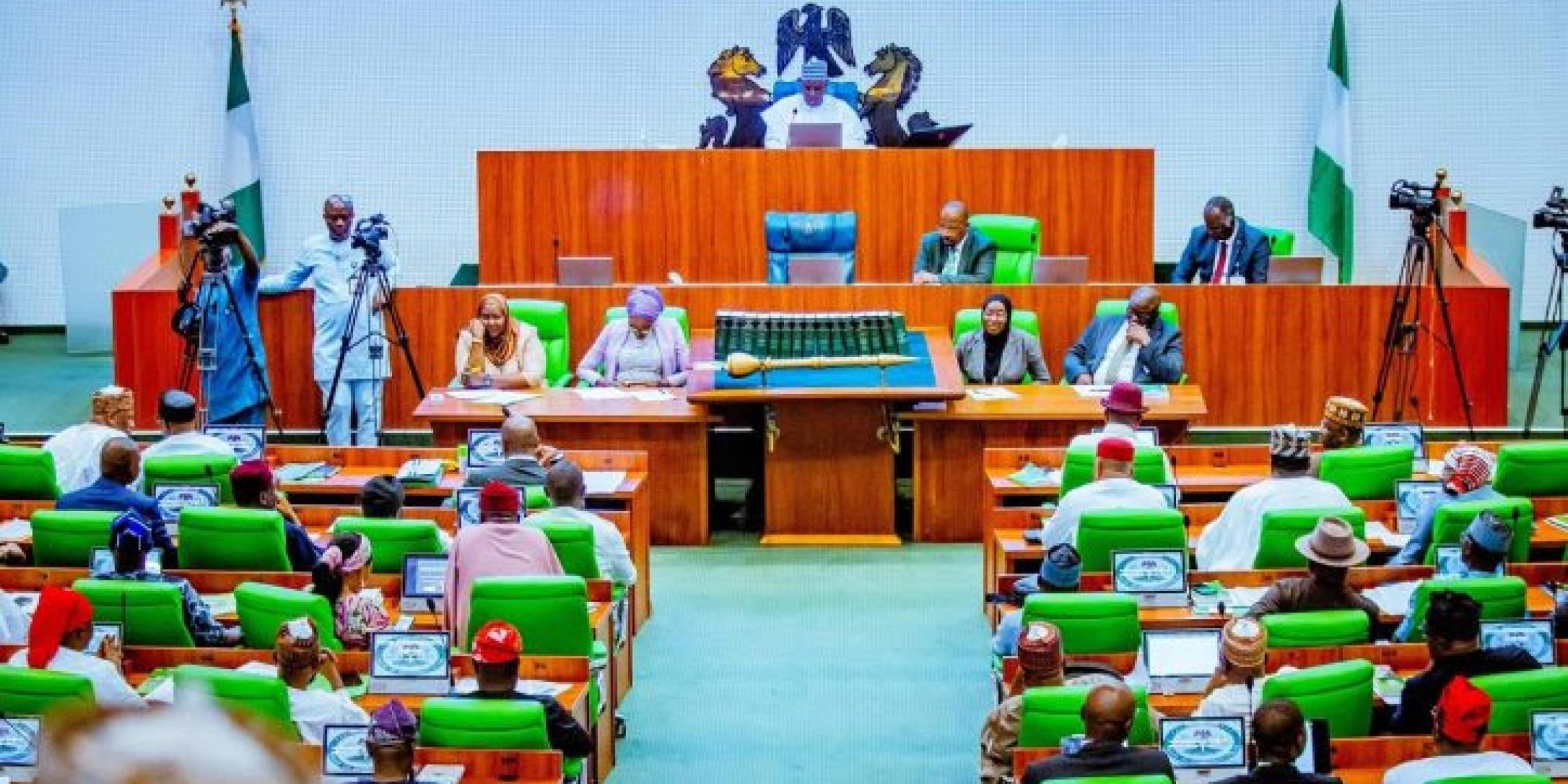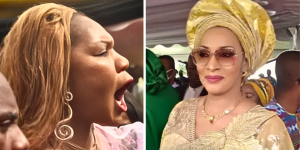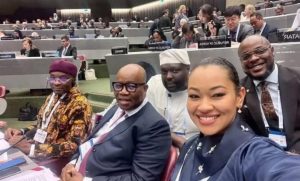House of Reps allegedly Receives $25k bribe, Backs Tinubu’s Emergency Rule in Rivers, Push for Shorter Suspension Period for Gov Fubara, Others
The Nigerian House of Representatives has overwhelmingly voted in favour of President Bola Tinubu’s declaration of a state of emergency in Rivers State. This decision came during a plenary session on Thursday, where lawmakers debated the emergency rule that was imposed amid the ongoing political crisis in the oil-rich state.
Speaker of the House of Representatives, Tajudeen Abbas, confirmed that 240 lawmakers attended the session, satisfying the quorum requirements. This majority vote highlighted the backing that President Tinubu’s declaration of a state of emergency in Rivers State now has within the legislative body.
The motion for approval was strongly supported by Hon. Odinaka Miriam Onuoha, who represents Okigwe North federal constituency in Imo State. In her contribution, Onuoha not only backed the emergency declaration but also argued for a reduction in the six-month suspension period imposed on Governor Siminalayi Fubara and other affected officials.
“I rise to second this motion as moved by my brother, that this house due support the proclamation in view that it should be reduced shorter than the six months period, when the two parties come to the table. Whether it is tomorrow or earlier than that. I so second the motion,” she stated during the session, which was monitored by GEENCEE via NASS TV.
This latest development is expected to spark further controversy. Political stakeholders and civil society groups are already questioning the necessity of an emergency rule in Rivers State. Critics argue that the move may be seen as a calculated attempt to suppress opposition forces and tighten federal control over the state’s governance.
The ongoing crisis in Rivers State has deepened over recent months. Allegations of power struggles, impeachment plots, and executive-legislative conflicts have rocked the state, with Governor Siminalayi Fubara at the center of the turmoil. The controversial emergency rule comes as federal authorities take over the state’s affairs, raising concerns about the future of Fubara’s leadership.
With the House of Representatives’ approval now secured, the next step will be for the Senate to determine whether Tinubu’s controversial emergency declaration will receive full legislative backing. This step is crucial in cementing the legal basis for the emergency rule to take full effect.
Rivers State, known for its oil-rich resources, has been a political battleground in recent months, with increasing tensions between state government officials and federal authorities. Governor Siminalayi Fubara has faced growing scrutiny, with various accusations swirling around him, including claims of corruption and poor governance. As the political environment in the state becomes increasingly volatile, there have been fears of violence and instability, which may have pushed the federal government to intervene through a state of emergency.
The declaration of a state of emergency is a significant move by the federal government. It allows for the suspension of certain civil liberties, the dissolution of local governments, and the imposition of direct control by federal authorities. While it is a constitutional tool available to the president in times of crisis, it has been met with significant opposition from various quarters, particularly those who believe that such a measure may infringe on democratic principles.
One of the key issues raised during the plenary session was the length of time for which Governor Fubara and other officials will be suspended. While the state of emergency includes a six-month suspension period, some lawmakers, including Onuoha, have called for this to be shortened. She expressed the hope that the suspension could be lifted sooner if both parties involved in the political crisis could come to the table for negotiations.
“I rise to second this motion as moved by my brother that this house due support the proclamation in view that it should be reduced shorter than the six months period,” Onuoha said, adding that the situation could be resolved faster if both sides were willing to compromise.
This call for a shorter suspension period reflects the sense of urgency in resolving the ongoing political standoff in Rivers. However, it also points to the complexity of the situation, with deep-rooted divisions between local political actors and the federal government.
Opposition figures and legal experts are already weighing the constitutional implications of the state of emergency in Rivers State. Some have vowed to challenge the declaration in court, arguing that it may not meet the constitutional requirements for such an extreme intervention.
Reuben Abati, a prominent Nigerian journalist and commentator, has stated that President Tinubu’s declaration could be an impeachable offence. He expressed concern over the legality of such a declaration, suggesting that it could undermine the democratic process in the country.
“I believe that Tinubu’s declaration of a state of emergency in Rivers State is an impeachable offence,” Abati said, pointing to the potential overreach of executive power. Critics of the emergency rule also argue that it sets a dangerous precedent for the future, one that could allow the federal government to step in and impose direct control over any state facing political turmoil.
The legal challenges could escalate further as opposition parties and civil society groups mobilize to question the legitimacy of the move. Legal battles over the constitutionality of the state of emergency could drag on for months, potentially creating a significant distraction from other pressing national issues.
As the House of Representatives has now endorsed the emergency declaration, the next stage in the process will be the Senate’s decision on whether to approve or reject the emergency rule. This will be a crucial moment in determining the political fate of Rivers State, as well as the broader implications of federal intervention in state governance.
There are also concerns about how the emergency rule will affect ordinary citizens in Rivers State, particularly those who may already be suffering from the ongoing political instability. The imposition of federal control over the state could lead to disruptions in governance and public services, particularly if local officials are sidelined or replaced by federal appointees.
In the meantime, Governor Fubara’s future remains uncertain, and the political crisis in Rivers State continues to unfold. The federal government’s decision to declare a state of emergency signals a new chapter in the state’s political drama, one that will likely continue to evolve over the coming weeks and months.
For the record, Speaker Tajudeen Abbas confirmed that 240 members attended the plenary session, surpassing the quorum requirements for the vote. This is a significant point in the legislative proceedings, as the quorum was necessary for the validity of the motion. Abbas also noted that the session had adjourned until next Tuesday, signaling a pause in the proceedings before the Senate’s involvement.
“I want the house to note that today’s plenary is being attended by 243 members based on our attendance register. Just for the record, we’ve more than satisfied the requirement for this particular amendment,” the Speaker said as the session came to a close.
The approval of the state of emergency in Rivers State by the Nigerian House of Representatives is a significant development in the country’s ongoing political landscape. As the state continues to grapple with internal strife and federal intervention, the future remains uncertain. While the move has been welcomed by some, it has also raised serious legal and constitutional questions that will likely be contested in the courts.
The focus now shifts to the Senate, where further debate will take place, and where the final decision on the emergency declaration will be made. The coming days and weeks will be crucial in determining the next steps for Rivers State and its leadership.





